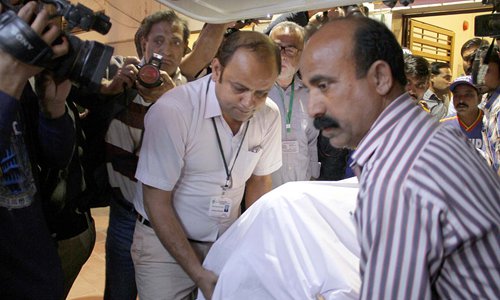
Early in February, a shooting incident took place in Karachi, Pakistan. Chen Zhu, an employee of an affiliate of China's COSCO Shipping Lines in Pakistan was killed.
In recent years, South Asia has been severely afflicted by international terrorism, and India and Pakistan often trade accusations over these incidents. Terrorism is the common enemy of the international community and all countries concerned should work together to effectively combat terrorism.
The Belt & Road (B&R) initiative proposed by China in 2013 has drawn great attention and a positive response from the world. Over the past few years, the B&R initiative has gradually moved from the initial proposal stage and project planning work to the implementation phase. The covered area has also expanded, radiating to Eurasia and extending to Africa, the Americas and Oceania to provide China's wisdom and a blueprint for the solution of human problems.
Global terrorist activities are rampant, and fighting them is difficult for the international community. Although ISIS has retreated in the Middle East, terrorist threats in other regions are pressing harder and harder. In spite of some international progress, a number of countries are still in a predicament over terrorism. The B&R initiative faces a complicated and serious security situation.
In recent years, overseas Chinese-funded institutions and personnel have been frequently victimized by terrorist attacks, armed hijackings and criminal activities. Some of these incidents have resulted in deaths.
Given these circumstances, the Chinese government, academic research institutions, State-owned enterprises and private enterprises have paid increasing attention to the safety of institutions and personnel of overseas Chinese-funded enterprises. They have constantly studied and perfected their safety precautions.
In more than 20 years of working overseas, I have had contact with a number of overseas Chinese-funded institutions and provided much help in security issues and case handling. In practical terms, it's important to make it clear that the host governments and cooperative partners should take primary responsibility for the safety of Chinese-funded enterprises, institutions and their personnel.
Some overseas construction projects of Chinese-funded enterprises are backed by government aid and some are commercial ventures. However, regardless of this difference, they are helping the social and economic development of the country where they are located. Thus, local military and security departments are entirely responsible for the security of Chinese-funded enterprises and institutions. This point must be clearly made when signing government agreements or commercial contracts.
In the meantime, Chinese-funded enterprises and institutions should maintain close communication with the military and security authorities in the country of residence throughout the construction process. They should keep in close contact with administrative, military and police intelligence units, mass organizations and local overseas Chinese. They should donate funds to local schools, hospitals and communities when conditions permit and hold some recreational activities to create a safe and harmonious working and living environment.
Of course, overseas Chinese-funded enterprises and institutions should attach great importance to safety precautions, closely follow the local security situation, formulate and continually improve their contingency plans, strictly enforce safety precautions and regulations and take steps to secure staff living quarters, project sites and personnel travel routes.


